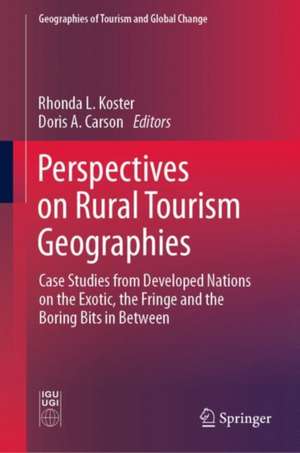Perspectives on Rural Tourism Geographies: Case Studies from Developed Nations on the Exotic, the Fringe and the Boring Bits in Between: Geographies of Tourism and Global Change
Editat de Rhonda L. Koster, Doris A. Carsonen Limba Engleză Paperback – 9 mai 2020
These contributions from international, expert authors help to identify the opportunities and challenges that affect rural regions, from places at the urban fringe to exotic remote spaces and taking in the ‘boring bits in between.’ Both the analysis and the framework used will be of value to scholars and students of rurality, tourism, regional development, rural policy,geography, and destination management. Readers will gain a deeper understanding of the rural context in developed countries and a robust conceptualization of rural tourism geographies.
| Toate formatele și edițiile | Preț | Express |
|---|---|---|
| Paperback (1) | 631.64 lei 38-44 zile | |
| Springer International Publishing – 9 mai 2020 | 631.64 lei 38-44 zile | |
| Hardback (1) | 732.70 lei 22-36 zile | |
| Springer International Publishing – 21 mar 2019 | 732.70 lei 22-36 zile |
Preț: 631.64 lei
Preț vechi: 831.10 lei
-24% Nou
Puncte Express: 947
Preț estimativ în valută:
120.90€ • 131.37$ • 101.62£
120.90€ • 131.37$ • 101.62£
Carte tipărită la comandă
Livrare economică 16-22 aprilie
Preluare comenzi: 021 569.72.76
Specificații
ISBN-13: 9783030119522
ISBN-10: 3030119521
Pagini: 271
Ilustrații: X, 271 p. 42 illus., 34 illus. in color.
Dimensiuni: 155 x 235 mm
Ediția:1st ed. 2019
Editura: Springer International Publishing
Colecția Springer
Seria Geographies of Tourism and Global Change
Locul publicării:Cham, Switzerland
ISBN-10: 3030119521
Pagini: 271
Ilustrații: X, 271 p. 42 illus., 34 illus. in color.
Dimensiuni: 155 x 235 mm
Ediția:1st ed. 2019
Editura: Springer International Publishing
Colecția Springer
Seria Geographies of Tourism and Global Change
Locul publicării:Cham, Switzerland
Cuprins
Introduction.- Case Study from Australia.- Case Study from Canada.- Case Study from Sweden.- Discussion and Conclusion for Exotic Remote.
Notă biografică
Dr. Koster is a rural tourism geographer, with a research focus on the contribution of tourism towards rural sustainability in resource-based regions. She has expertise in the areas of determinants of success in rural tourism planning; building capacity for tourism development with First Nations communities; experiential tourism development and the role of Appreciative Inquiry; gateway communities and protected areas; rural tourism in the Canadian urban fringe; and frameworks for evaluating tourism as a community economic development endeavor. She has received two awards for her research – an Aboriginal Partnership Research Award and recognition as one of the top 50 researchers at Lakehead University. She has been a part of several Social Sciences and Humanities Research Council-funded research projects, all focused on rural development and tourism.
Dr. Carson is an assistant professor at the Department of Geography at Umeå University in northern Sweden. She is a cultural geographer interested in the socio-economic development of small communities in sparsely populated areas. Her research focuses on changing population mobilities and their contributions to new development paths and innovation in remote resource peripheries, particularly those found in Australia and Sweden. She has previously conducted research into destination evolution and how peripheral tourism sectors can act as ‘systems of innovation’. She is currently part of several research projects funded by the Swedish Research Council Formas, which focus on the impacts of urbanization on mobilities and socio-economic change in the sparsely populated north of Sweden and Australia. She is also a co-investigator on a major project looking at sustainable Arctic tourism futures.
Textul de pe ultima copertă
This book examines rural tourism across three different contexts, acknowledging the complexity of rural places. It applies a systematic comparative framework across nine case studies from Australia, Canada and Sweden. The case studies address the uniqueness of different rural spaces, while the framework incorporates many theoretical aspects from human geography including spatial, historic, institutional, demographic, socio-economic and network perspectives. In the course of applying this comparative case study framework, the book identifies numerous implications for planning and policy in rural settings.
These contributions from international, expert authors help to identify the opportunities and challenges that affect rural regions, from places at the urban fringe to exotic remote spaces and taking in the ‘boring bits in between.’ Both the analysis and the framework used will be of value to scholars and students of rurality, tourism, regional development, rural policy,geography, and destination management. Readers will gain a deeper understanding of the rural context in developed countries and a robust conceptualization of rural tourism geographies.
These contributions from international, expert authors help to identify the opportunities and challenges that affect rural regions, from places at the urban fringe to exotic remote spaces and taking in the ‘boring bits in between.’ Both the analysis and the framework used will be of value to scholars and students of rurality, tourism, regional development, rural policy,geography, and destination management. Readers will gain a deeper understanding of the rural context in developed countries and a robust conceptualization of rural tourism geographies.
Caracteristici
Offers a much-needed contribution to the understanding of rurality in developed countries Refreshes notions of tourism geographies with a collective, in-depth analysis Applies a systematic comparative framework to three rural tourism contexts










